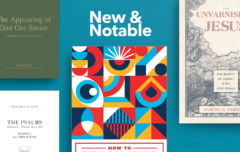Sometimes the form is as important as the function. This is common when it comes to art or to certain kinds of technology, but rare when it comes to books. But here’s an exception: James Anderson’s What’s Your Worldview? employs a unique form to address a common function, making this an unusual and unusually creative work.
Let’s talk function first. This is a book about worldview, your “all-encompassing perspective on everything that exists and matters to us.” Whether we know it or not, we all have a worldview which accounts for our most important beliefs and the assumptions we have about this world. “It reflects how you would answer all the ‘big questions’ of human existence, the fundamental questions we ask about life, the universe, and everything.” Is there a God? Is there objective truth? Is there life after death? Is there a purpose to existence? These are all questions that pertain to and are answered by worldview.
Worldviews are like cerebellums: everyone has one and we can’t live without them, but not every knows that he has one.
Anderson says “Worldviews are like cerebellums: everyone has one and we can’t live without them, but not every knows that he has one.” This, then, is not merely a book about worldview—we already have plenty of those—but a book meant to lead a reader to understand and evaluate the various options so he can identify his worldview. He may be deist or theist, materialist or mystic, pantheist or polytheist, or just about anything rational or irrational combination.
This is the function of the book: identifying that worldview. But the form merits special mention. Do you remember those old Choose Your Own Adventure books? My brother loved those books when he was a boy and he accumulated quite a collection. Instead of telling a story in a linear way, beginning at the first page and ending at the last page, the Choose Your Own Adventure books allowed the reader to make decisions and, based on those decisions, to turn to one page or another, to move the story in this direction or that. In this way the reader was fully involved in the story and took on the role of a character. There were a variety of possible outcomes to the book, and the outcomes were determined by the reader’s choices.
What’s Your Worldview? is structured in much the same way. It is not meant to be read in a linear fashion. Instead, the reader is asked questions at the end of each page, and the answer to each of those questions will lead him along different paths and to different conclusions. “Is there a Supreme Being that deserves our worship and gives meaning, purpose, and direction to the universe and to human life?” If you believe there is, you will turn to page 45; if you believe there is not, you will turn to page 43. Your choices determine your outcome, which is to say, your choices define your worldview.
While the subject matter of What’s Your Worldview? is not novel, the form is, and that makes this an interesting and enjoyable book to read. It offers a uniquely interactive approach to finding answers to life’s biggest and most important questions. It makes identifying your worldview, and perhaps replacing it with a better one, just a bit of an adventure. I like it.










